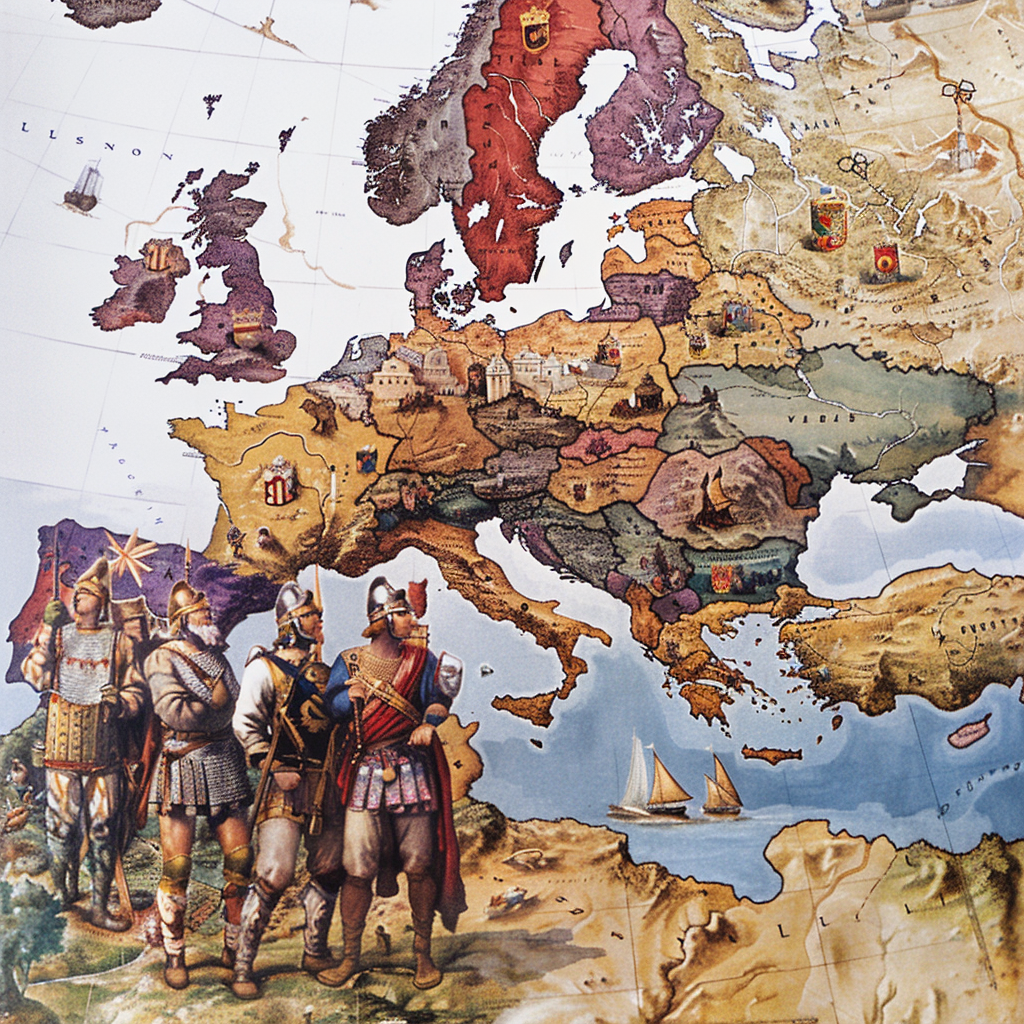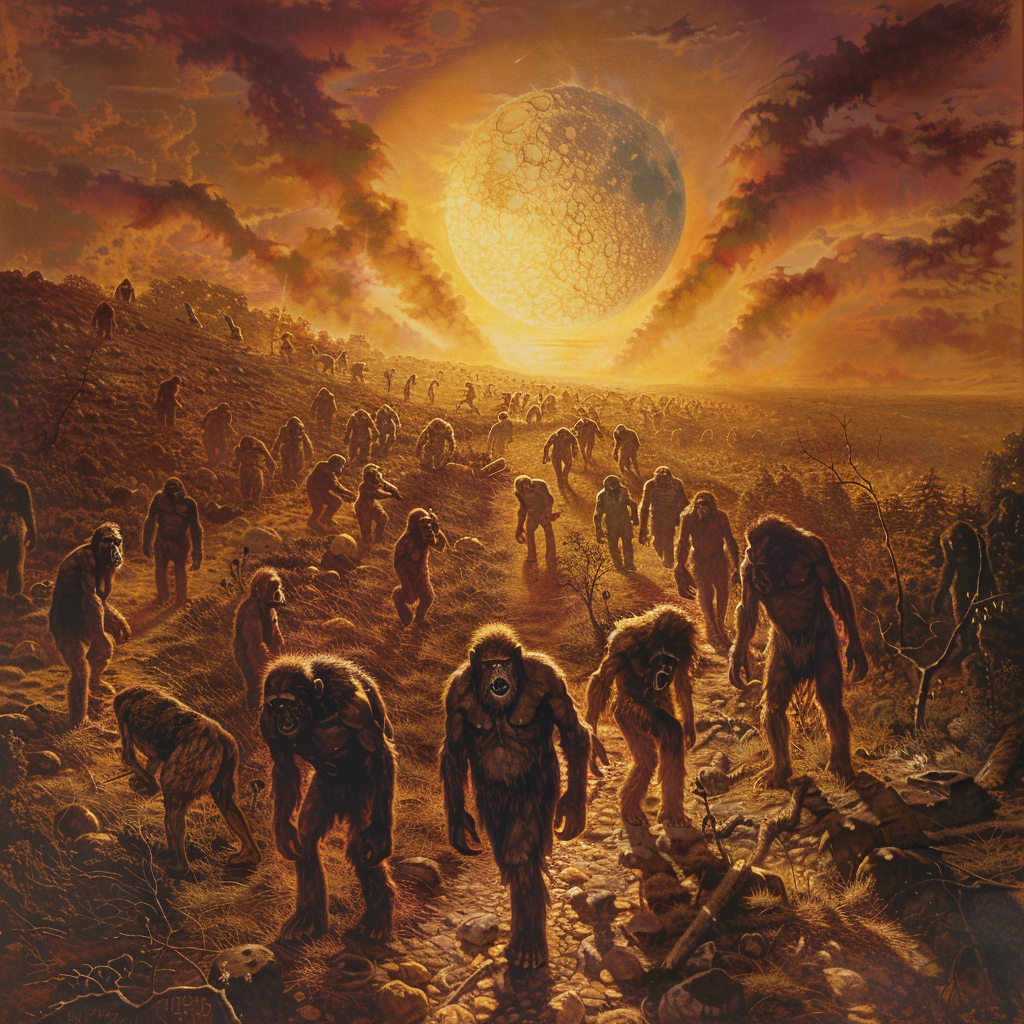Empires fused small cultures and facilitated the spread of information and goods to create a powerful unified system, and European empires were able to conquer and dominate the world due to a combination of factors, including science and technology, climate, geography, and disease.
Empires helped to fuse many small cultures into a few large ones. Within empires, ideas, people, goods, and technologies spread more easily than in politically fragmented regions. The availability of information sharing, ease of commerce, and unification of goods that empires fostered helped bind people together. As a result, the imagined organization of empire was maintained. The people who led empires didn’t stop there. They deliberately spread ideas, institutions, customs, and norms to make it easier for them to rule, further cementing the imaginary systems that people had built. For 2,500 years, empires have been the world’s most common form of political organization, and their ease and convenience have allowed them to persist into the modern era.
The influence of empires was not just political and economic, but also had a profound effect on cultural integration and development. The formation of empires has allowed human civilization to advance by leaps and bounds through the fusion and development of diverse cultures and knowledge. For example, in the case of the Roman Empire, the fusion of various peoples and cultures led to the creation of new technologies and ideas, which laid the intellectual soil for the Renaissance and Industrial Revolution in medieval Europe. Thus, we can see that the existence of empires is not just a matter of military and economic integration, but also deeply connected to the development of humanity as a whole.
In the modern era, empires have been centered in Europe. Until recently, European nations conquered and colonized other nations in order to dominate the world, and no one can deny that Europe has been an imperial power, especially when you consider the fact that Britain has been called the land where the sun never sets. But this begs the question: why was Europe able to grow its empire and conquer the world?

If the empires of the European region were the ones that had global influence and were more powerful than any other empire in the world from the very beginning of the concept of empire, then this question can be easily answered. “Europe was able to conquer the world because it had economic and military superiority over other empires based on the power it had at the beginning of its formation.” We might say, “Yes. However, this answer is not very convincing. The balance of power was not in Europe’s favor at the beginning of the empire’s formation. In Chapter 15 of Homo sapiens: The Marriage of Science and Empire, the author states. “It was not until the end of the fifteenth century that any significant military, political, or other empire emerged in Europe. But even after the emergence of empires, Europe was no match for the Asian powers, and Europe was able to conquer the Americas only because the Asian powers had little interest in the region.” As you can see, Europe never had much influence as an empire, and by 1775, Asia accounted for 80 percent of the world’s economy, making Europe a peripheral player. So how did Europe manage to conquer the Americas and take over the world’s economy and territory in just 200 years?
The author uses science and technology to answer this question. In the 1800s, the Industrial Revolution took place in Europe, which marked a milestone in human history. Europe overcame its differences by embracing mass production and the leaps in science and technology that the Industrial Revolution made possible. China’s inability to embrace science and technology stems from differences in social structure and ideas about society. Europe was in the habit of thinking and acting in a scientific and capitalist way before it had technological superiority, while China and the rest of the world were not. But this argument is flawed. First, this habit has not been objectively and scientifically proven. It’s a stretch to claim that there is a habit of thinking scientifically based on social structure alone. There’s also no mention of what the “habit of thinking scientifically” is, which makes it even less convincing. Even if we assume the authors’ claims are true, there are problems. Even before the Industrial Revolution in the 1800s, people were making progress through scientific discoveries. In the authors’ view, this doesn’t explain why China was ahead of the curve in pre-industrial development. For example, inventions that are considered history-changing, such as paper, gunpowder, and stirrups, all came from Asian countries, and Europe worked hard to import these technologies through trade. If Europeans were in the habit of thinking scientifically, they would have been more advanced in this regard than their Asian counterparts even before the Industrial Revolution. However, this was not the case, and they had inferior technology compared to Asian countries, which means that there were other reasons besides the Industrial Revolution in the 1800s for Europe to expand its empire.
In addition to the Scientific Revolution, which is the rationale proposed in ‘ Homo sapiens, there are two additional reasons why Europe was able to spread its imperial hegemony around the world.
The first is climatic and geographical influences. Climatic influences allowed empires to spread rapidly from east to west. The Earth has tropical, temperate, cold, and boreal climates as you move upward from the equator. Due to the influence of sunlight on the Earth, there are generally similar climate zones at different latitudes. This horizontal distribution of similar climate zones has made it much easier for the crops that humans depend on to spread horizontally. ‘Jeremy Diamond’, author of Guns, Germs, and Iron, says, “Organisms and cultures have evolved to adapt to the climate and natural environment of a region, making it easy to move within a climate, but much harder to move between climates.” The migration of crops within similar climates eventually led to the spread of staple foods, which in turn led to cultural uniformity in dietary habits. Starting with this cultural unity, empires were able to quickly take over Eurasia and other continents. Even with this cultural unity, the Europeans were able to outcompete the Chinese because of the differences in the crops they grew. The Chinese lived in the middle of the continent, where they developed a humid climate and ate rice as a staple food. Rice was limited to growing in rainy regions, making it difficult for it to spread westward to arid Europe, Africa, and elsewhere. However, the crops that Europeans relied on for staple foods, such as wheat and potatoes, had fewer climatic constraints than rice. They could be grown with less rainfall, allowing them to spread to many regions.
Geography also played a role in Europe’s ability to outpace China. Even if climatic influences allowed crops to spread, empires would be slow to grow if it was not easy to reach new areas. China was located in the middle of the Eurasian landmass, with the vast Pacific Ocean to its east and nowhere else to go. In the Midwest, the deserts prevented staple crops from spreading, which explains its relatively slow expansion. In Europe, there were similar climatic zones to the east that were favorable for expansion. To the west, there was the Atlantic Ocean, but it was narrow enough to allow for the spread of crops and empires after the discovery of the Americas. Furthermore, its proximity to the African continent created environmental conditions that allowed it to spread, unlike China, which had no continent around it. In other words, it can be said that not only the advancement of science and technology, but also the accidental advantages of geography helped Europe to dominate the world.
European empires were also able to open up new trade routes and acquire a variety of resources through aggressive maritime exploration. The Age of Exploration, led by the Portuguese and Spanish, put Europe on a stronger economic footing, which fueled the expansion of empires. The resources and wealth gained from maritime exploration were instrumental in enabling European empires to increase their military might and conquer larger territories. The success of these maritime explorations was undeniably a key factor in Europe’s global dominance.
The European conquest of the New World happened in an incredibly short period of time, even considering the advances in science and technology, climate, and geography. There were other factors at play in the growth of the European empire in the Americas. Namely, disease. It wasn’t economic or scientific factors that contributed to the growth of the empire, but life itself. As people in Europe privatized their livestock, they naturally had a lot of contact with animals. In the process, they were exposed to the diseases that animals carried, and they naturally developed immunity to the diseases that spread from them. This was not the case for people in the Americas. They were not exposed to livestock and did not have the opportunity to build immunity until the arrival of Europeans. When Europeans arrived, it wasn’t their technology, it wasn’t the geography, it wasn’t the climate, it was the germs. ‘Jeremy Diamond’, author of ‘ Guns, Germs, and Iron,’ writes, “Of the Native Americans who lost their lives after Europeans set foot in the Americas, far more died of diseases caused by pathogens brought from Europe than died on the battlefield. Between 100 and 200 years after Columbus, diseases introduced from Europe decimated the entire Native American population by 95 percent.” He said. In the blink of an eye, 95% of the indigenous population was decimated by European diseases such as smallpox, measles, malaria, and tuberculosis. It was easy for the Europeans to take over a region that had been emptied of people. Diseases were an unintentional part of the European empire’s conquest of the Americas and beyond.
The idea that Europe was able to build a world dominating empire as a superpower simply because of the advancement of scientific knowledge is not well founded. We can see that not only technology, but also seemingly unrelated factors such as topography and disease played a role in the formation of empires. In this respect, we can see that the theory of imperial growth presented in ‘ Homo sapiens ‘ has significant logical deficiencies.

Therefore, it is important to understand that the formation and expansion of empires is the result of a combination of factors. The European empires were able to conquer and dominate the world because of more than just one or two factors. Political stability, economic wealth, technological innovation, climatic and geographical conditions, and even biological factors all played a role. The interplay of these complex factors allowed Europe to expand its empire faster and stronger than other regions. This illustrates why it’s important to go beyond a simple cause-and-effect analysis when trying to understand historical events and phenomena.
As you can see from the example of empire growth in this blog post, there is no single cause for any event in history. There are many factors that work together to shape history, some of which we may not be able to predict at all. Of course, it may be impossible to interpret history in a way that anticipates all of these aspects. What we should be wary of is interpreting history in only one aspect. In order to explain history, we need to analyze enough economic, scientific, and environmental aspects to be able to interpret history fully and correctly.
 I’m a blog writer. I want to write articles that touch people’s hearts. I love Coca-Cola, coffee, reading and traveling. I hope you find happiness through my writing.
I’m a blog writer. I want to write articles that touch people’s hearts. I love Coca-Cola, coffee, reading and traveling. I hope you find happiness through my writing.